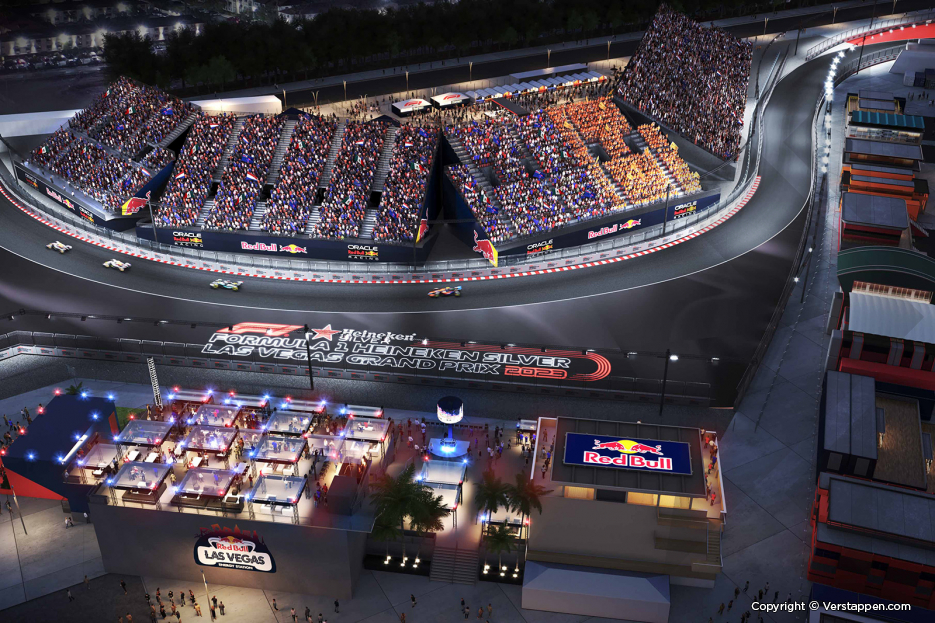F1: Las Vegas GP to be biggest sporting event in world
There’s never been a race more hyped in Formula 1 history than the Las Vegas Grand Prix.
Red Bull F1 boss Christian Horner says that interest is so high from sponsors and guests for the Las Vegas GP that he has never seen anything like it.
“Vegas is going to be the biggest sporting event on the planet this year. I mean, it’s going to be insane, that race,” says Christian Horner, team principal of series champion Red Bull Racing. “I’ve never seen interest in a Grand Prix like this one.”
While The Indianapolis 500 may argue that their race is the biggest in the world, the Las Vegas GP dwarfs it in ticket sales revenue, sponsor revenue and global TV viewership.
Comments like that have sent the European F1 Traditionalists into a tailspin because they thought for years their F1 races were all that really mattered.
Every venue on the Strip is primed to party, with newly renovated facilities and a festive atmosphere filled with entertainment and either balcony viewing or a watch party.
That includes Sports Illustrated’s Club SI on the Strip, which, as part of its three-day, $7,500 ticket, also offers access to parties hosted by the likes of David Beckham and Shaquille O’Neal.
Sports Illustrated spent $1 million converting the three-story Margaritaville restaurant at the Flamingo into Club SI, and plenty of other brands are pouring money into sponsorships and hospitality suites
The European traditionalists think it is all too much, but of course they’ll watch and learn how good racing and great entertainment can indeed go hand-in-hand.
Even individual teams are spending big. Mercedes team principal Toto Wolff says his team is investing nearly $15 million into a hospitality unit expected to hold nearly a thousand people—“the biggest single activation that we’ve ever had,” double the price of the team’s next-costliest headquarters, at the Miami Grand Prix.
Liberty Media CEO Greg Maffei said on the earnings call last week that “Vegas is proving to be a bigger spectacle, and more impactful, than we had anticipated,” but he also emphasized that “we remain very bullish on the impact of Formula 1 overall in Las Vegas, and the potential for this race to be a profitable exercise itself” in future years.
“We did incur significant expense in launching year one in Vegas,” Liberty Media CEO Greg Maffei said in a call with Wall Street analysts. “And that included extra provisions for safety, security and traffic planning, which was required by local regulators.
“And we had several non-recurring items; for example, our first-year-only opening ceremony, and the design and launch of our multipurpose app, and creation of a fan database.
“We remain highly confident in the increased efficiency to operate there and our growing profitability in years two and beyond, and we remain bullish on the broader value creation at LVGP that far outweighs the increased investment and start-up costs.”
Racing purists balked at some of the changes. For instance, when Liberty’s Maffei said in 2018 that F1 is all about “selling glamour and parties,” Mercedes’ Wolff sneared that the series “isn’t a shopping channel.”
But it’s hard to argue with the results. F1’s market cap now tops $15 billion, and its ten teams are now worth $1.9 billion on average, according to Forbes estimates, up 276% from $500 million in 2019.
Ferrari (at $3.9 billion) and Mercedes (at $3.8 billion) now rank among the world’s most valuable teams in any sport. These days, Wolff tells Forbes, “the interest and excitement for Formula 1 is unheard-of in the United States, and the popularity has grown over the last few years to a level that I didn’t think was possible.”
Las Vegas currently has only a three-year deal with Formula 1, raising the possibility that the race could fall off the schedule in 2026. Still, the two sides are clearly committed to making the relationship last. Nevada’s Clark County has already granted permission to stage the race on the Strip through 2032, clearly having taken note of projections that the Grand Prix will inject $1.2 billion into the local economy—roughly twice what Super Bowl LVIII is expected to deliver in February.
Those estimates are a function of several factors, explains the LVCVA’s Hill, including the number of ticket-holders (roughly 100,000 for the Las Vegas Grand Prix versus 65,000 for the Super Bowl) and the average hotel stay (three or four nights vs. two). Hill takes particular delight in the event’s timing, over the traditionally dead weekend before Thanksgiving. “It’s been the 51st-best weekend in every other year, and now it will be the best,” he says.
